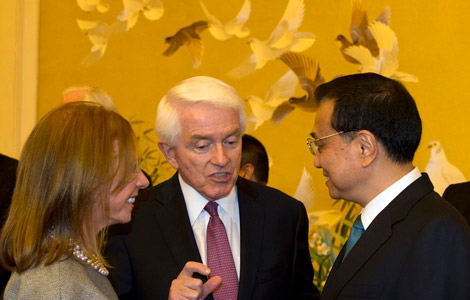Chinese investments favored by Brazilian media, but PR still lacking
Updated: 2014-07-09 16:44
(Xinhua)
|
||||||||
RIO DE JANEIRO - Brazilian media see Chinese investments in their country in a highly positive way, but a lack of knowledge about China's business culture may affect that view, according to a survey released by Brazilian communications agency In Press.
According to the survey, Chinese investments have a positive impact on Brazilian media of 77.2 percent, and China is regarded as a partner to Brazil's growth.
"This has a lot to do with the investments Chinese companies make here. There is a perception that China helps Brazil's development," Janaina Silveira, business development executive at In Press, told Xinhua.
However, some cultural differences when it comes to business get in the way of an even more positive perception of Chinese companies, according to In Press.
There is, for example, the matter of open communication channels. In Brazil, In Press observed, "companies build their reputations on a solid ground set by a permanent and open communication channel between media and corporations". In that scenario, a lack of spokespeople designated by Chinese companies to deal with the local media can pose a problem.
"Sometimes, when you try to talk with a Chinese company, they do not have a spokesperson or prefer not to talk. It reveals a cultural difference between the two countries. In Brazil it is very common that companies have spokespeople and hold media training sessions to teach them to deal with media," Silveira said.
"In Brazil it is important that companies have a good reputation and that is built on both their relation with the government and with the media; showing your face, showing transparency and integration with the country's culture is essential. It is important to have a local connection."
In addition, Brazilians have little knowledge of Chinese industrial production, sometimes not even knowing that big companies such as Lenovo are Chinese. They also view China's production in a somewhat old-fashioned manner, Silveira said.
"Brazilians still think of China as they did in the 1980s or 1990s, when they started exporting a lot to us," she said. Exports at the time were comprised of mainly cheaper consumer goods, not expensive and durable goods like cars, for example, and China's production is still widely associated with those cheaper products, even though there are large Chinese companies in the country operating in the auto industry, electronics, and energy fields.
"You need to work on building companies' reputation to ensure that business is done in an easier manner," Silveira said.
Economic relations between China and Brazil have grown significantly since the two countries established diplomatic relations in 1974. Bilateral trade amounted to 83.3 billion U.S. dollars last year according to Brazilian trade data. China has been Brazil's largest trade partner since 2009.
The figures are expected to grow, as new investments and joint initiatives are likely to be announced next week during Chinese President Xi Jinping's state visit to Brazil, the first since he took office.
In addition to meeting with President Dilma Rousseff, Xi will also attend the 6th BRICS Summit, which will take place in Fortaleza, in Brazil's northeastern region.

 Brazil launches China desk to handle economic ties with China
Brazil launches China desk to handle economic ties with China
 NY Wheel reels in Chinese EB-5 investors
NY Wheel reels in Chinese EB-5 investors
 The Penguins of Madagascar to enter China
The Penguins of Madagascar to enter China
 Panda cub Bao Bao turns one
Panda cub Bao Bao turns one
 HK kid's symphony returns to NY
HK kid's symphony returns to NY
 China, US reach agreement
China, US reach agreement
 40 bodies from jet returned to Dutch soil
40 bodies from jet returned to Dutch soil
 Dance troupe's fusion performance wins over judges
Dance troupe's fusion performance wins over judges
Most Viewed
Editor's Picks

|

|

|

|

|

|
Today's Top News
Manufacturing hits an 18-month high
Transformers producers hit with breach of contract suit
US chipmaker to be deemed monopoly
Chinese still seek Beckel termination
One dead in shooting in Philadelphia
France: Air Algerie plane 'probably' crashed
TransAsia crash while landing in Taiwan
China, UC-Davis set up food safety center
US Weekly

|

|






